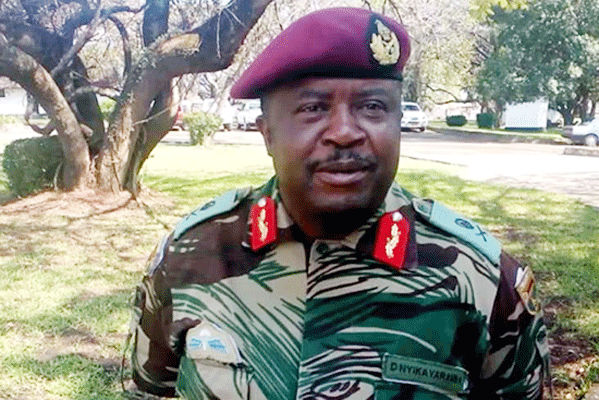
A top general has warned that the chronic funding of the army has become a threat to national security, saying soldiers may fail to defend the country in the event of a major attack.
BY VENERANDA LANGA
Major General Douglas Nyikayaramba, the chief of staff (administration) in the Zimbabwe National Army (ZNA) told the parliamentary committee on Defence and Home Affairs soldiers were wearing tattered uniforms and equipment was woefully inadequate.
Nyikayaramba said the army was no longer able to do regular training programmes because of lack of money.
“If anything happens here in Harare where there is potential for confusion, I tell you there will be massacres because a bomb will just fall on people,” he said.
“We now have growth points, which means that modern warfare is going to be in built up buildings.
“It means that if soldiers are not trained, they are going to kill civilians, but we had to cancel all that training because there was no money.”
The Defence ministry had requested for $964,9 million in the 2018 budget, but government has revised it downwards to $77,3 million.
- Chamisa under fire over US$120K donation
- Mavhunga puts DeMbare into Chibuku quarterfinals
- Pension funds bet on Cabora Bassa oilfields
- Councils defy govt fire tender directive
Keep Reading
However, Nyikayaramba said the ZNA had a $53 million debt for rations bought on credit last year and another $19 million in unpaid water and electricity bills.
“We are going to have elections in 2018 and this budget did not take into account that the country is going to require assistance from soldiers,” he said.
The general appeared to be accusing the government of failing to tap into the country’s natural resources in order to turn around the economy.
“The resource envelope is not enough because people think that taxing vehicles from Japan is the only way to get revenue,” he added.
“If you go to the army headquarters, some soldiers are now even bringing their own pots to cook.”
“This year we should consume rations amounting to $17 per day per soldier, but according to the allocation, it means that we are going to feed a soldier for 68 cents, and it is even going to go down to 43 cents.
“We asked for $3,2 million for uniforms and ceremonial dress but were allocated $1,3 million — a third of the ideal requirement — yet soldiers need three pairs, which will cost $12 million to $15 million.”
“If you look at the turnout of ZNA soldiers, they have torn trousers, some of them patched, but this is the soldier who is supposed to give you the last line of defence in this country if push comes to shove.
“This speaks volumes about the capacity of ZNA to prevent aggression and endure in conflict because it completely destroys your moral fibre.
“We cannot continue like this if we are serious about the need for defence in this country.”
Nyikayaramba said due to power cuts as a result of unpaid bills, soldiers’ rations and explosives that need coolers had been affected.
He said the army had 40 000 personnel and recruitments had been frozen due to lack of money.
“If you do not have equipment, then you fill in the strength with a massive number of people, or you reduce the staff with good equipment,” the general said.
“If we are not careful, we are soon to have an army without privates because when others retire, you need to fill in the gaps.”
Nyikayaramba said even the army fuel tanks were empty with allocations of sometimes 1 000 litres per brigade with 26 vehicles that consume 500 litres each.










